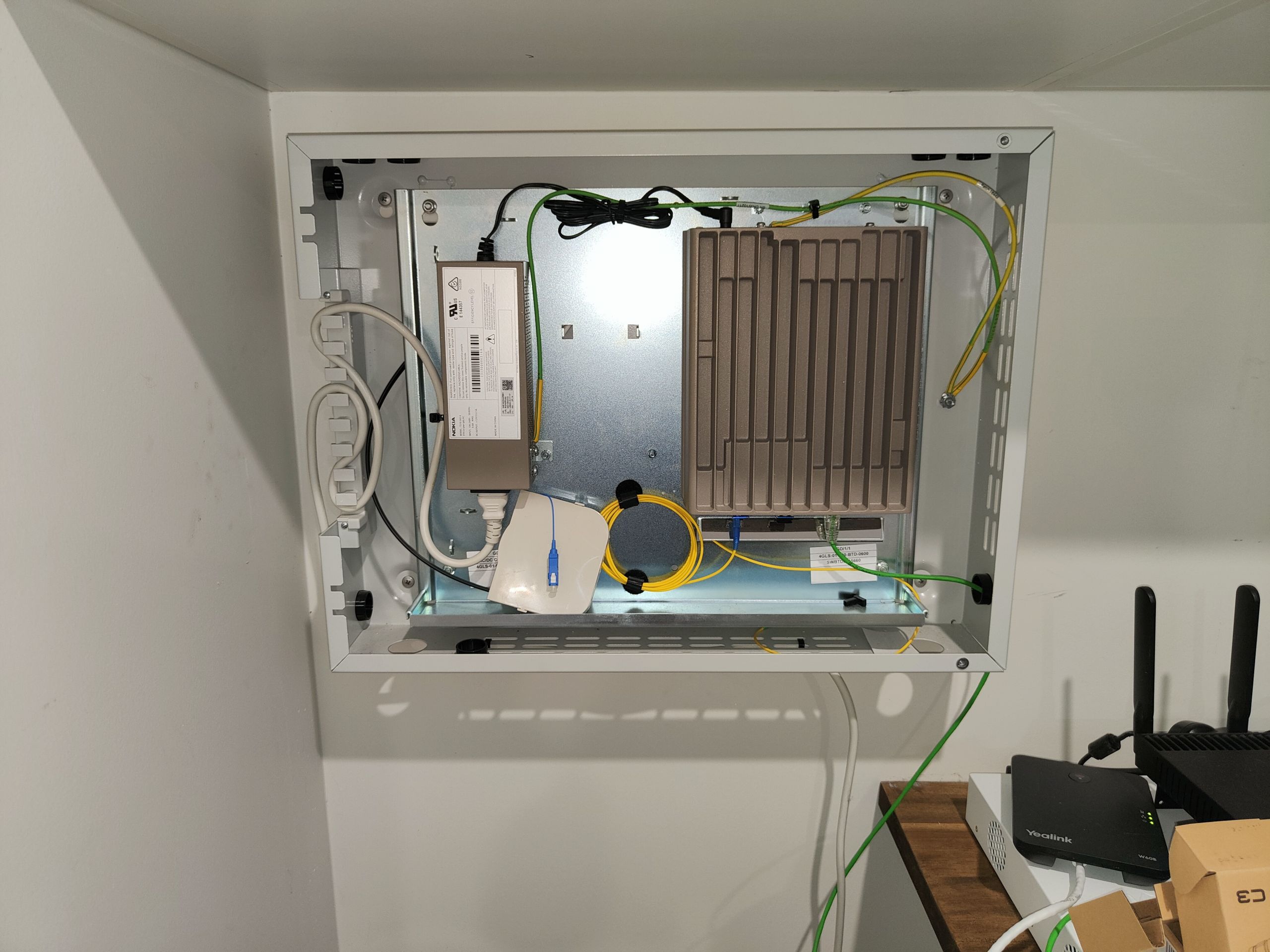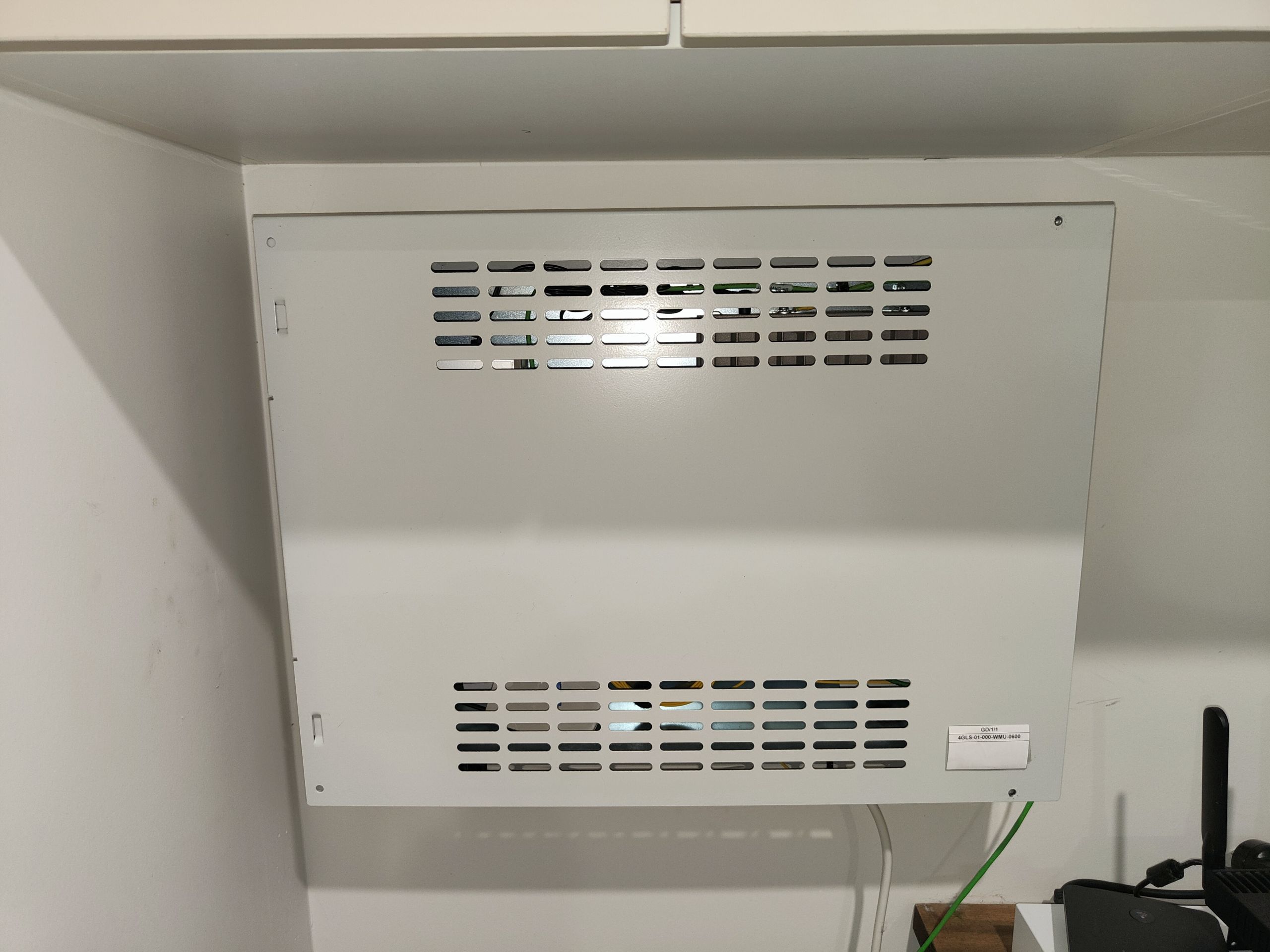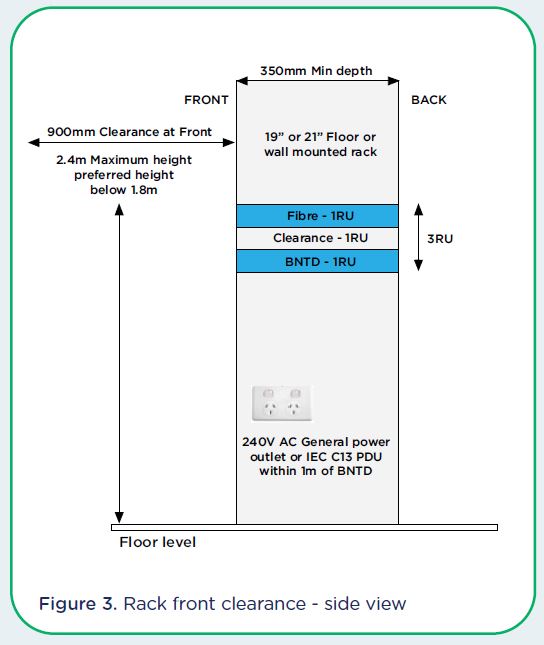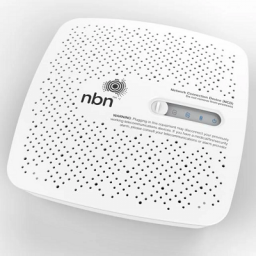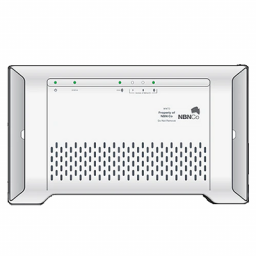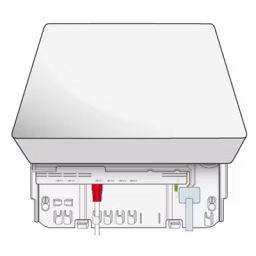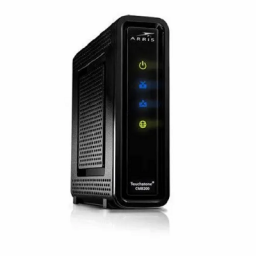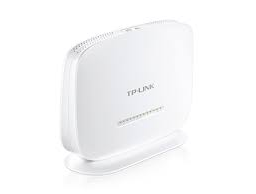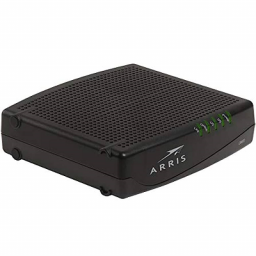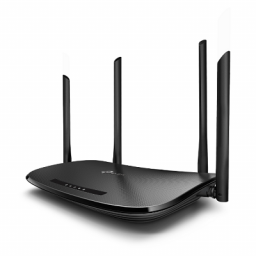NBN Enterprise Ethernet Pre-Requisites
NBN Enterprise Ethernet Pre-Requisites
If you are deciding to connect to NBN Enterprise ethernet you will need to make sure you have the following installed at the location you plan to install the NBN Enterprise Ethernet NTD.
- 1 x standard power outlet – GPO. Please note, this must be a socket and not a power board.
- 1 x Earthing Point
Standard GPO:
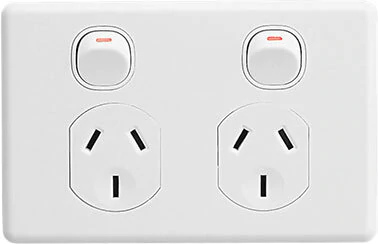
Earthing Point:
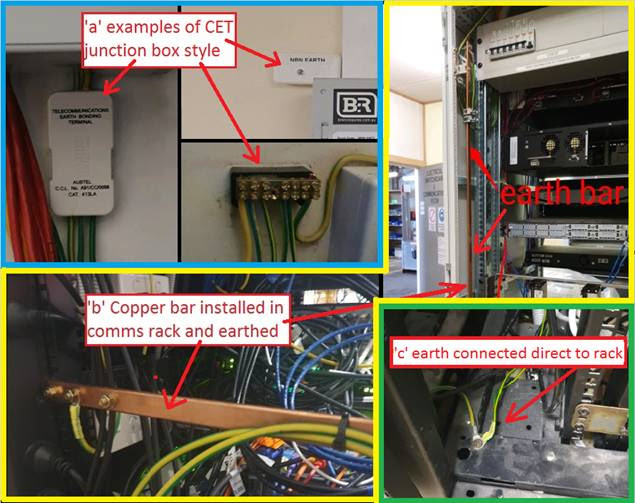
Access and Permission
The delivery partner (DP) completing the installation of your nbn Enterprise Ethernet will need permission from the building owner/management to complete the low-impact installation.
Initially, a site survey/visual inspection will be completed before any physical work is to be completed. From the visual inspection, a detailed plan will be put together of how the installation will be completed. It will outline the cable paths and what penetrations (if any) will be required.
This plan will be provided to the building owner/management for approval to proceed.
The activities will involve a visual inspection of the property (including any common areas within its boundaries) and any existing telecommunications networks. The visual inspection may also include walking around the outside of the premises, testing of existing infrastructure and equipment, minor hand digging to expose existing underground assets, taking photos and recording relevant information.
Rack or Wall Mounted Equipment
You will need to decide whether you want the equipment (BNTD) to be installed on the wall or inside your existing data cabinet/rack. The ideal location for a business nbn Network Termination Device (BNTD) is a server room or communications room.
The location and installation must comply with the relevant standards, including the Business nbn Equipment Location Requirements Guide and
Building Code of Australia Volumes 1 and 2 for safety and maintenance purposes.
You will need to ensure there is sufficient space to install the equipment and that the Delivery Partner (DP) will be able to get the new fibre cable to the location. You will need to provide access to a normal power point outlet and an Earth (Communications Earth Bonding Terminal or CET).
The chosen wall must be flat, and suitably constructed for fixing the nbn equipment enclosure. Health, Safety & Environment (HS&E) standards and nbn engineering standards require that the wall must also meet a set of both minimum and maximum measurements. These are outlined at a high-level in Figure 1a and 1b; further detail is available in the Equipment Location Requirements Guide.
The customer should ensure no obstructions are placed in front of the BNTD, for safety and optimal operation.
Where the wall-mount enclosure is placed within a cupboard or cabinet, the space must meet minimum clearance requirements.
Below is an example of what a Business Network Termination Device (BNTD) looks like installed.
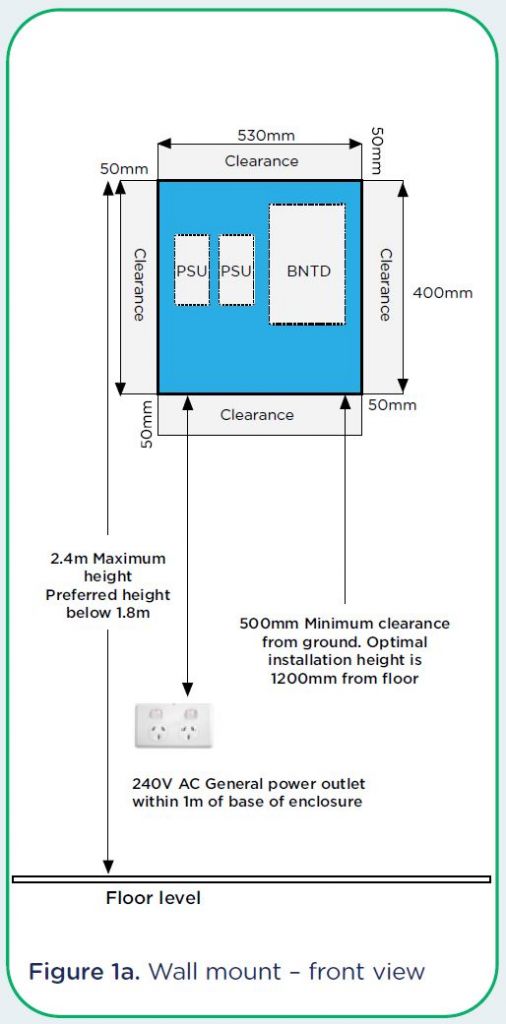
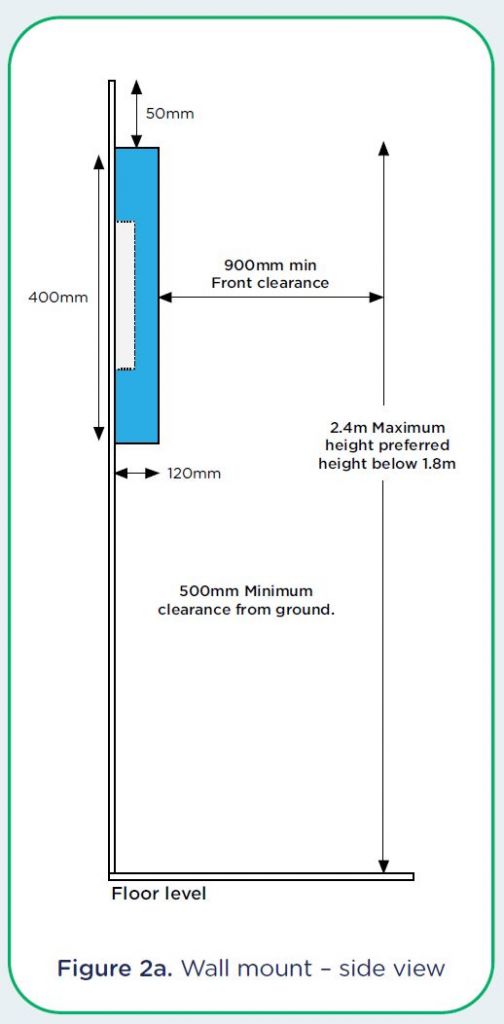
You will need to ensure that at least 4 RU of space is available for the equipment to be installed (BNTD) and that the Delivery Partner (DP) will be able to get the new fibre cable to the location. You will need to provide access to a normal power point outlet and an Earth (Communications Earth Bonding Terminal or CET).
BNTD and PSUs can be installed in a suitable customer-supplied communications rack if one is available. Minimum space and clearance requirements must be met by the available rack space.
The customer must supply the rack if requiring a rack-mounted solution. The rack and surrounding area must meet minimum and maximum measurements, for equipment placement, clearance and ventilation. These are outlined at a high level in Figures 2 and 3; further detail is available in the Equipment Location Requirements Guide.
Customers selecting a rack-mounted solution should ensure no other equipment is placed in the reserved rack space.
Earthing and power connections should be as per AS/NZS3000:2018 – these specifications will be amended
from time to time.
Business nbn Enterprise Ethernet requires the customer to provide the following:
- 240V AC General Power Outlet (GPO) per AC PSU ordered. The GPO should be located within 1000mm.
nbn will not be able to install the wall mount in any of the following locations:
- In a boiler, plant or machine room
- In areas of return air supply i.e. areas likely to be contaminated by return air, exhaust air systems and smoke extraction
- In areas subject to extreme or rapid temperature changes or, temperature/humidity likely to cause condensation in equipment rack(s)
- In areas where corrosive or flammable fumes or fluids are used or stored
- In a fire escape stairway
- In a fire control room or anywhere that restricts access to a fire control centre or panel
- In a cupboard containing a fire hose reel
- Wet areas including locations near baths, showers, basins, tubs, fixed water containers, spa pools, spa tubs, swimming pools, fountains, water features or water pumps
- Within 1.5m of a water basin or sink
- Within a refrigeration room or diesel generator room
- Within an earth potential rise hazard zone
- In an area exposed to outdoor weather conditions or external walls
- Under floors or basements with reduced heights / in false ceilings / attics or roof spaces
- In locations where the wall mount is likely to have materials resting against the BNTD / PSU
- Within 0.5 m from a heater or air conditioner unit (wall mount)
- Within a defined hazardous area
- In a stairwell
- In unsecured communal areas
- In hallways or passageways
- Car parks
nbn will not be able to use an existing rack located in any of the following locations:
- In a boiler, plant or machine room
- In areas of return air supply i.e. areas likely to be contaminated by return air, exhaust air systems and smoke extraction
- In areas subject to extreme or rapid temperature changes or, temperature/humidity likely to cause condensation in equipment rack(s)
- In areas where corrosive or flammable fumes or fluids are used or stored
- In a fire escape stairway
- In a fire control room or anywhere that restricts access to a fire control centre or panel
- In a cupboard containing a fire hose reel
- Wet areas including locations near baths, showers, basins, tubs, fixed water containers, spa pools, spa tubs, swimming pools, fountains, water features or water pumps
- Within 1.5 m of water basin or sink
- Within a refrigeration room or diesel generator room
- Within an earth potential rise hazard zone
- In an area exposed to outdoor weather conditions or external walls
- Under floors or basements with reduced heights / in false ceilings / attics or roof spaces
- Within 0.5 m from a heater or air conditioner unit
- Within a defined hazardous area
- In a stairwell
- In unsecured communal areas
- In hallways or passageways
- Car parks
Learn more about the business nbn Equipment Location Requirements Guide at: https://url.net.au/business-nbn-equipment-location-guide-v7


